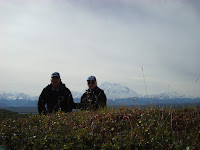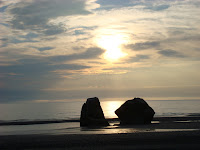Fairbanks and an interesting town called
Nenana
We left
Riley Creek campground in Denali National Park about 11:30 after a sound
sleep. It was a good time to leave as
the weather had taken a real dip. Dark
cloud and a cold wind whipped through the park.
We were headed for a little town that we had read about and it really
sounded like a place to spend a couple days.
As it turned out it was not what we had expected.
Nenana was at one time the supply depot
for the miners and fur traders in the area. There was a large River boat that
shuffled man and goods to Fairbanks up the Tanana River.
With the onset of the
Railroad the town has come to its’ demise.
The town comes to life during the Salmon fishing season. And Bear and
Moose hunting is big in the winter as the hunters are transported by boat to
the back country from this town.
A note of
interest is that the Iditarod race originated in Nenana. There had been a threat of a diphtheria
epidemic in Nome and a 20-pound capsule holding the serum was railed to Nenama
from Seward. On Jan.27, 1925 , in the coldest part of winter, it was more
than-40 degrees and planes could not
fly, so a relay team of 20 mushers,
using over a hundred dogs, passed the package from village to village along the
trail to Nome. They arrived on Feb. 2, with the serum firmly wrapped in
quilting, but frozen solid. It was thawed, and many lives were saved.
We pulled onto the Richardson Hwy. Tuesday Aug
21 about noon with a Fairbanks map in hand. Autumn is very evident on the
hillsides as the Birch and Cottonwood trees are changing colors and the leaves
are starting to fall. Along the road we
would see a tree that the leaves were so yellow it looked like a spot light was
on it.
As we drove into Fairbanks we saw that the City worked hard to have lots of flowers giving off color to the city.
The down town area had hanging flower pots and street side pots at most corners. At 1:30 we got settled into space 29 at the Chena River Recreation site a park in the State Park system. C&J were given a letter stating they were to be allowed to stay without charge in most State Parks and the Host honored the letter. We were pleased to find the site had water and electricity, two things we had not enjoyed in other State Parks.
As we drove into Fairbanks we saw that the City worked hard to have lots of flowers giving off color to the city.
The down town area had hanging flower pots and street side pots at most corners. At 1:30 we got settled into space 29 at the Chena River Recreation site a park in the State Park system. C&J were given a letter stating they were to be allowed to stay without charge in most State Parks and the Host honored the letter. We were pleased to find the site had water and electricity, two things we had not enjoyed in other State Parks.
It was
early, so after lunch we took off to check out the town and to find the Wells
Fargo Bank so we could pick up the Canadian cash we had ordered for our travels
through that area. We found the town
easy to get around and since they were doing some road work in down town we
decided to head out to see the old gold mining area of Fox. The countryside was still green, rolling
hills with a wide roadway leading from town.
The Gold Dredge #8 is located in Fox and since the parking lot was full
of tour busses we passed on the idea of seeing it up close but we could see it
from the road and saw that it must of have been a noisy behemoth piece of
machinery. It was shut down in 1959 with environment worries. We returned to
camp over the Farmers Road where the Musk Ox and Caribou research center is
located and found it closed so decided to come back during the morning lecture
to learn about this curiously interesting animal.
The park is
located on the North end of Fairbanks and nicely located to all the attractions
in the area. C&J walked down to the Chena River and checked out the park
grounds then walked over to the Mexican restaurant for a drink. It was a nice
evening and a great ending to an interesting day.
Wednesday
was a lazy day and a day to do chores and shopping. Late in the afternoon Chuck
felt like he needed a nap so while he slept Jane walked down to the river. I took my Eagle friend Freedom and my fishing pole in hopes of bringing home dinner. But no luck at the quiet Tanana river.
While down there she called to find out where BJ and Dixie were located and found they were at the Fairbanks hospital.
While down there she called to find out where BJ and Dixie were located and found they were at the Fairbanks hospital.
What? When?
How? Is he Ok now? Were the only things Jane could think of as the shock of
learning that BJ had just gone in for surgery.
He had complained of pressure in his chest and Dixie got him right to
the Doctors office. The Dr. sent him
directly to the hospital and within a couple hours he had had surgery and was
in recovery. It seemed that 95 % of the
main artery of his heart was plugged so the Dr. put in a couple stints and said
he would do well. Dixie said they would send him home on Thursday. Jane said
she would check in on Thursday afternoon.
Thursday
morning early we headed to the U of AK Musk oxen, Rain Deer and Caribou
Research center to learn about these local animals. Upon arrival we saw big
bull Muskoxen sparing. It seems it is
mating season and the 3 bulls in the yards nearest the road were not chosen to
be breeders so were upset and fighting each other.
They would back off at a distance and then at 40 miles an hour, run at each other and bang heads. The noise was unnerving but the impact was felt mostly by their huge horns. We learned that Musk Oxen are more related to the Goat and Sheep and are not, at all, an Oxen. They have a nasty attitude and are not able to be domesticated. The student that was talking with us said they can turn on a person very quickly so they are handled with great care and safety. The undercoat of their fur is combed out and is weaved into a fine, light and warm fabric. It is hard to come by and very expensive.
 We learned the difference
between Caribou and Rain deer.
We learned the difference
between Caribou and Rain deer.
The heavier and stronger Caribou can be domesticated and has been for many years.
The Rain deer have a more slight body and are not domesticated. They are just deer.
They would back off at a distance and then at 40 miles an hour, run at each other and bang heads. The noise was unnerving but the impact was felt mostly by their huge horns. We learned that Musk Oxen are more related to the Goat and Sheep and are not, at all, an Oxen. They have a nasty attitude and are not able to be domesticated. The student that was talking with us said they can turn on a person very quickly so they are handled with great care and safety. The undercoat of their fur is combed out and is weaved into a fine, light and warm fabric. It is hard to come by and very expensive.
 We learned the difference
between Caribou and Rain deer.
We learned the difference
between Caribou and Rain deer. The heavier and stronger Caribou can be domesticated and has been for many years.
The Rain deer have a more slight body and are not domesticated. They are just deer.
We left the
study grounds and went over to the University Museum. The Museum is very well done with great
displays and beautiful art work. C&J were there for 4 hours and know they
missed some of the displays but they were getting tired and still wanted to
stop to see the Sand hill Cranes.
At Creamer’s Field Migratory Water Fowl Refuge they watched as the Sand hill Cranes and Canadian Geese settled onto the fields for the evening. It was dinner time so they stopped at the Loose Moose restaurant for a sandwich and then it was back to camp. After a game of cards it was bed time.
At Creamer’s Field Migratory Water Fowl Refuge they watched as the Sand hill Cranes and Canadian Geese settled onto the fields for the evening. It was dinner time so they stopped at the Loose Moose restaurant for a sandwich and then it was back to camp. After a game of cards it was bed time.
 Friday
morning Dixie called to say BJ was doing fine and that he was up and about and
we were welcome to stop by before leaving Fairbanks. So on our way to North Pole we stopped in for
a short visit. BJ looked great and was
eager to share how his alarming day had gone.
He was pleased with the service and care all of the doctors and staff
had given him. We think he was thanking
his lucky star for being in Fairbanks when this emergency happened. The Dr. wanted him to be seen in a week so
they were settled into an RV park that wasn’t far from the Hospital. We promised to stay in touch and with hugs
and" see you when you come through Oregon", we headed to North Pole.
Friday
morning Dixie called to say BJ was doing fine and that he was up and about and
we were welcome to stop by before leaving Fairbanks. So on our way to North Pole we stopped in for
a short visit. BJ looked great and was
eager to share how his alarming day had gone.
He was pleased with the service and care all of the doctors and staff
had given him. We think he was thanking
his lucky star for being in Fairbanks when this emergency happened. The Dr. wanted him to be seen in a week so
they were settled into an RV park that wasn’t far from the Hospital. We promised to stay in touch and with hugs
and" see you when you come through Oregon", we headed to North Pole. 





















































